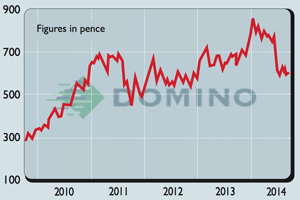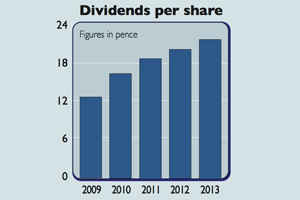Shares in focus: Playing the waiting game
The bear case for Domino Printing Sciences is easy to make, says Phil Oakley. So, is there anything to be said for buying the shares?
Get the latest financial news, insights and expert analysis from our award-winning MoneyWeek team, to help you understand what really matters when it comes to your finances.
You are now subscribed
Your newsletter sign-up was successful
Want to add more newsletters?

Twice daily
MoneyWeek
Get the latest financial news, insights and expert analysis from our award-winning MoneyWeek team, to help you understand what really matters when it comes to your finances.

Four times a week
Look After My Bills
Sign up to our free money-saving newsletter, filled with the latest news and expert advice to help you find the best tips and deals for managing your bills. Start saving today!
Domino is a resilient business with decent long-term growth prospects, says Phil Oakley.
Domino Printing Sciences is a world leader in printing equipment and accessories. It designs and makes printing machines that can be used to print information on lots of different surfaces.
Its products are used extensively in the food, drink and pharmaceutical sectors where companies use printing to help promote their products. Printing can also help companies identify, trace and protect their products.
MoneyWeek
Subscribe to MoneyWeek today and get your first six magazine issues absolutely FREE

Sign up to Money Morning
Don't miss the latest investment and personal finances news, market analysis, plus money-saving tips with our free twice-daily newsletter
Don't miss the latest investment and personal finances news, market analysis, plus money-saving tips with our free twice-daily newsletter
If you've ever wondered how a best before' date or barcode found its way onto a bottle, packet or can, there's a good chance that a Domino printing machine helped it to get there.
Domino has been very good at what it does and has built up a very profitable business. It has many of the hallmarks of a top quality company, such as high returns on investment and a debt-free balance sheet.
Yet, its shares have fallen out of favour this year and are a third lower than their January peak. Investors have started to worry about how it will grow its profits in the years ahead and have been selling the shares.
So is Domino in trouble, or is it just facing a temporary blip in its fortunes?
The outlook
Domino upset the stockmarket recently by saying that it thinks that profits in 2015 won't be much different from this year's profits. Professional investors are a fickle bunch and tend to be far too focused on short-term profits rather than a company's long-term prospects.
To them it's all about hitting the numbers and making sure that next year's profits are always higher than this year's. A company that fails to meet these expectations often sees its share price take a battering.
Admittedly, investors' pessimism is sometimes justified. What management might describe as a pause in profit growth can be the beginning of a steady decline in the company's business.
That said, I'm inclined to believe that Domino remains a very good business with decent long-term growth prospects. At the moment it does have a few difficulties in Asia and other emerging markets where competitors are competing very aggressively on price.
This means Domino has to cut its prices to keep hold of its customers which in turn means it makes less money than it originally thought it would.
Profits are also being held back by increased investment in research and development. I actually think this is a positive sign. Domino has been successful in the past because it has consistently invested a decent chunk of its sales back into the research and development of new products.
It has not been afraid to sacrifice short-term profits for bigger ones later on. This has allowed it to make good products that customers want and more importantly kept it ahead of the competition. That's why Domino has been able to earn very high rates of return on the money it invests, shown by the 27.6% return it made last year.
But things aren't quite as simple as making good products. There has to be a demand for them. And the good news is, I'm bullish about that.
New laws are constantly appearing which force businesses to provide more information about the integrity and provenance of their products on their packaging. In the world of food and drugs, this is becoming increasingly important.
Companies need to protect themselves against counterfeiters as well as being able to trace their products when things go wrong or to improve their supply chains.
This leads to more demand for better, faster and more efficient ways of printing labels and information on products. Throw in a growing world population which will consume more goods and you have the foundations of a business that should be able to grow quite nicely in the future.
Domino is also well placed to profit from the growth in digital printing technologies which allow customers to print things faster and with lower costs. Its ink jet printers have been popular with customers and could do very well for the company.
Domino is also a very resilient business. About 45% of its sales come from selling new printing equipment with the balance coming from consumables (such as printing ink and spare parts) and servicing, which gives it a reasonably predictable income stream.
Should you buy the shares?
The bear case for Domino shares is very easy to make. Its shares are not exactly cheap, on about 16 times earnings, and profits have stopped growing.
However, this was a business that grew its underlying sales by 11% during the first six months of this year, which suggests that it continues to do what its customers need. If it wasn't for the strength of the pound (which reduces the value of overseas profits in sterling), profits would look a lot better than they were reported.
Don't get me wrong, there's probably no real rush to buy the shares, given that the trajectory of its profits is unlikely to excite the City for quite a while yet. But like lots of things in life, paying up a little bit extra for a dose of quality can often be a good thing to do.
If you are prepared to wait for a bit, then buying a few Domino shares now, while they are still relatively unpopular, could be a wise move in the long run.
Verdict: long-term buy
Domino (LON: DNO)


Buy: 7
Hold: 9
Sell: 1
Target Price: 650p
Directors' shareholdings
N Bond (MD): 73,349
A Herbert (CFO): 45,704
P Byrom (Chair): 302,000
Get the latest financial news, insights and expert analysis from our award-winning MoneyWeek team, to help you understand what really matters when it comes to your finances.
Phil spent 13 years as an investment analyst for both stockbroking and fund management companies.
-
 Should you buy an active ETF?
Should you buy an active ETF?ETFs are often mischaracterised as passive products, but they can be a convenient way to add active management to your portfolio
-
 Power up your pension before 5 April – easy ways to save before the tax year end
Power up your pension before 5 April – easy ways to save before the tax year endWith the end of the tax year looming, pension savers currently have a window to review and maximise what’s going into their retirement funds – we look at how